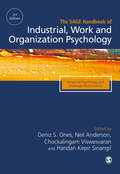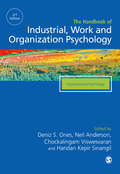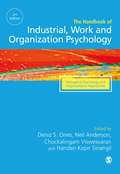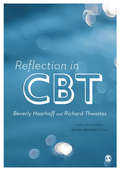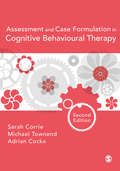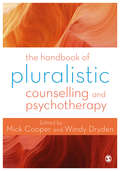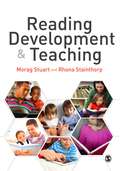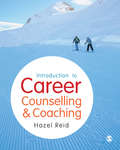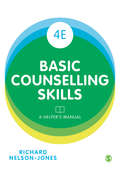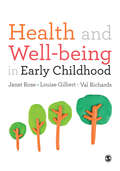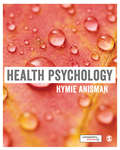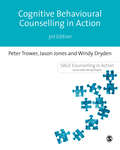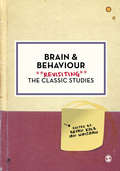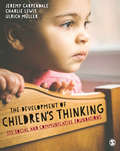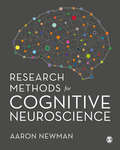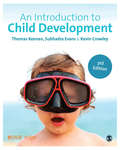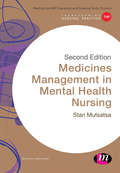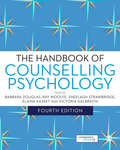- Table View
- List View
The SAGE Handbook of Industrial, Work & Organizational Psychology: V1: Personnel Psychology and Employee Performance
by Deniz S Ones Neil Anderson Dr Chockalingam Viswesvaran Handan Kepir SinangilThe first volume in The SAGE Handbook of Industrial, Organizational and Work Psychology introduces key concepts in personnel and employee performance from cognitive ability and the psychological predictors used in assessments to employee and team values. The editor and contributors present a clear overview of key research in the areas of behaviour change and how to assess individual job performance – making Volume I indispensable for anyone working in or studying Human Resource Management.
The SAGE Handbook of Industrial, Work & Organizational Psychology: V2: Organizational Psychology
by Neil Anderson Deniz S Ones Dr Chockalingam Viswesvaran Handan Kepir SinangilThe second volume in the SAGE Handbook of Industrial, Organizational and Work Psychology looks in detail at how teams and individuals function and perform. It covers motivation and organizational socialisation as well as the latest research into diversity and organizational culture in the workplace. There are also sections on social networks and how job loss and the experience of unemployment can affect individuals and wider groups within organizations. Part One: Lenses Part Two: Social and Political Order Part Three: Legacies Part Four: Problems and Problematics
The SAGE Handbook of Industrial, Work & Organizational Psychology: V3: Managerial Psychology and Organizational Approaches
by Neil Anderson Deniz S Ones Dr Chockalingam Viswesvaran Handan Kepir SinangilThe third volume in The SAGE Handbook of Industrial, Organizational and Work Psychology concentrates on business decision-making and the many factors influencing the adoption and implementation of IWO practices. Chapter topics include utility assessments of interventions, decision-making errors in IWO systems, large-scale interventions and best practices reviews. Volume Three offers a comprehensive overview of the field for anyone working in or studying managerial or organizational psychology.
Reflection in CBT
by Richard Thwaites Beverly HaarhoffDeveloping skills and competency in CBT is a complex process of which self-observation and self-reflection are an essential part. In this new book, leading figures Beverly Haarhoff and Richard Thwaites outline the rationale for a focus on self-reflective practice in CBT, before offering practical and accessible guidelines demonstrating how this can be achieved in training and practice. Highlighting relevant research throughout and using case studies to illustrate theory in practice, ten chapters consider: - reflection in training and in supervision and self-supervision, - reflecting on the therapeutic relationship, on our sociocultural perceptions and biases and on client feedback - how reflection is vital to self-care and to becoming a better therapist, supervisor and trainer. This is an essential read for trainees in both high and low intensity CBT programmes, those on broader CBT courses, and for qualified practitioners working independently to enhance their self-reflective capacity.
Assessment and Case Formulation in Cognitive Behavioural Therapy
by Michael Townend Adrian Cockx Sarah CorrieOffering a unique philosophical, theoretical and process-focused introduction to one of the cornerstones of CBT: assessment and case formulation. Updated and expanded to take account of the vast developments in the field of CBT since its first publication, this second edition follows a clear two part structure: - Part One introduces trainees to the key theory, practice and processes of assessment and case formulation - Part Two provides practical illustrations of the theory through 12 extended case studies, considering both 'simple' and 'complex' presenting issues. Each of these chapters follows a set structure to enable easy comparison. Offering all they need to know about this crucial part of their training, this is essential reading for trainees on any CBT course.
The Handbook of Pluralistic Counselling and Psychotherapy
by Windy Dryden Professor Mick CooperA practical resource that your students can return to again and again to guide and coordinate their pluralistic practice, it provides: Hands-on guidance to developing pluralistic practice: providing the tools, skills and practice frameworks A step-by-step understanding of how the ideas and methods of different orientations can contribute towards a pluralistic way of working The tools and understandings needed to work with clients to achieve the most common goals The tools and understandings needed to work with clients wishing to address particular issues such as depression, anxiety, addiction, health issues, suicidal thoughts An understanding of a range of professional and practice issues relevant to pluralistic practitioners. Each chapter offers definitions of key terms, several case studies, exercises and points for reflection, further reading, chapter introductions and summaries of key learning points, and overviews of relevant research.
Reading Development and Teaching (Discoveries & Explanations in Child Development)
by Professor Rhona Stainthorp Morag StuartThis textbook will prove invaluable to teacher educators, teachers, educational psychologists, and any professional who is involved with teaching children to read. It provides a detailed examination of the processes that are involved in achieving fluent word reading skills and ability to comprehend written texts. Understanding these processes and their development empowers teachers to select appropriate, evidence-based teaching strategies and thus teach children more effectively. The book is in four parts: Part 1 provides the reader with a Tutorial Review covering essential knowledge about language, and presenting the two dimensions of the Simple View of Reading. Part 2 concentrates on the word reading dimension, with chapters on processes in skilled word reading, the development of these processes, and practical advice on research validated teaching methods to develop children's word reading skills. Part 3 turns to the language comprehension dimension, with chapters on the comprehension of oral and written language, and on teaching reading comprehension. Part 4 introduces the reader to assessment practices and methods of identifying children with difficulties in either or both dimensions of the Simple View, and considers children with word reading difficulties and children with specific comprehension difficulties, describing effective evidence-based interventions for each type of difficulty.
Introduction to Career Counselling and Coaching
by Hazel ReidA practical introduction for those training in the field of career development, career counselling and career coaching, this book will take your students through established and emerging theory and the different contexts in which career work takes place introducing the key skills, techniques and models they'll need. Professional issues such as the use of digital technologies highlight the contemporary context of careers work and all of this is brought to life through engaging case studies and reflective questions, highlighting the practical applications of what is being learnt.
Basic Counselling Skills: A Helper's Manual
by Richard Nelson-JonesThis practical bestseller from leading expert Richard Nelson-Jones introduces the essential counselling skills for the helping professions. Now in its fourth edition, it guides you through the key skills for helping work across a range of settings, such as counselling, nursing, social work, youth work, education and many more. It explores 17 key counselling skills, including: -asking questions -monitoring -facilitating problem solving -negotiating homework Each chapter describes a particular skill, illustrates it using clear case examples across a range of settings and then helps you consolidate and practise what you've learned through a set of creative activities. Further chapters cover professional issues including a new chapter on managing crises and chapters on ethical dilemmas, supervision, working with diversity and more.
Rose, Gilbert, Richards. Health and Well-being in Early Childhood
by Janet Rose Louise Gilbert Val RichardsThe health and well-being of children is integral to learning and development but what does it actually mean in practice? This textbook draws on contemporary research on the brain and mind to provide an up-to-date overview of the central aspects of young children s health and well-being a key component of the revised EYFS curriculum. Critically engaging with a range of current debates, coverage includes early influences, such as relationships, attachment (attachment theory) and nutrition the role of the brain in health and well-being the enabling environment other issues affecting child development To support students with further reading, reflective and critical thinking it employs: case studies pointers for practice mindful moments discussion questions references to extra readings web links This current, critical and comprehensive course text will provide a solid foundation for students and practitioners on a wide range of early childhood courses, and empower them to support and nurture young children s health and well-being. "
Health Psychology (SAGE Foundations of Psychology series)
by Professor Hymie AnismanHormones in your gut can affect the way you behave, prenatal infections have been associated with the development of schizophrenia and women doing shift work are more likely to develop diabetes. This book looks at fieldwork and health promotion through a psycho-social and biological perspective, to limit the occurrence of illness. We might not always be successful in preventing or overcoming every pathological condition through psychological and life-style changes, but at the least, stress can be diminished and quality of life can be enhanced. The author presents both key and up-to-date studies to help the reader explore the varied ways in which the biological, physiological and social factors at an individual and systematic level all affect psychology and how effective interventions can influence the health of a population. Mapped to course requirements and exploring bio-social, developmental and life-style factors in relation to physical and psychological disturbances, Health Psychology is an indispensable companion for undergraduate and postgraduate students in psychology, health sciences, nursing and education students. Supported by a wealth of learning features and additional content, this book will give your students: Access to the SAGE companion website which includes interactive quizzes, author selected videos, further reading, glossaries, testbanks and powerpoint slides 17 chapters packed with case studies, the latest research and areas of study The knowledge and skills to link theory to practice
Health Psychology (SAGE Foundations of Psychology series)
by Professor Hymie AnismanInstructors - Electronic inspection copies are available or contact your local sales representative for an inspection copy of the print version. Hormones in your gut can affect the way you behave, prenatal infections have been associated with the development of schizophrenia and women doing shift work are more likely to develop diabetes. This book looks at fieldwork and health promotion through a psycho-social and biological perspective, to limit the occurrence of illness. We might not always be successful in preventing or overcoming every pathological condition through psychological and life-style changes, but at the least, stress can be diminished and quality of life can be enhanced. The author presents both key and up-to-date studies to help the reader explore the varied ways in which the biological, physiological and social factors at an individual and systematic level all affect psychology and how effective interventions can influence the health of a population. Mapped to course requirements and exploring bio-social, developmental and life-style factors in relation to physical and psychological disturbances, Health Psychology is an indispensable companion for undergraduate and postgraduate students in psychology, health sciences, nursing and education students. Supported by a wealth of learning features and additional content, this book will give your students: Access to the SAGE companion website which includes interactive quizzes, author selected videos, further reading, glossaries, testbanks and powerpoint slides 17 chapters packed with case studies, the latest research and areas of study The knowledge and skills to link theory to practice
Cognitive Behavioural Counselling in Action (Counselling in Action)
by Windy Dryden Mr Jason Jones Dr Peter TrowerThis best-selling, practical, evidence-based guide to the cognitive behavioural approach takes you step-by-step through the process of counselling, from initial contact with the client to termination and follow up. The book follows a skills-based format based around the Bordin and Dryden model of bonds, goals, tasks and views, with expanded case material to further illustrate links between theory and practice. This third edition includes new content on: · the working alliance - what it is and why it is so important · challenges and pitfalls in the counselling process · when to challenge and when not to challenge clients beliefs · emotional problems such as shame, guilt and jealousy as well as anxiety, depression and anger. Drawing on their own extensive experience and contemporary research, the authors provide a concise overview of the cognitive behavioural approach, with new material on emotional problems rarely covered in practitioner guides, a strong emphasis on the therapeutic alliance, and updated bibliographic references throughout. Praise for the Previous Edition: "An elegant and informative guide to the practice of cognitive behavioural counselling ... recommended for all CBT practitioners." - Mick Power, Professor of Clinical Psychology, University of Edinburgh "A deserved best-seller for over 20 years. Peter Trower and colleagues have completely revised and updated the book in light of the enormous scientific achievements of CBT in this time. This brilliant book is essential reading for all cognitive behavioural practitioners." - Max Birchwood, Professor of Youth Mental Health, University of Birmingham ?"An absolutely wonderful book on cognitive behavioural counselling. It includes not only the basic information but also recent conceptual advances in the field. Truly, I cannot recommend this book highly enough!" - E. Thomas Dowd, International Editor, Journal of Cognitive Psychotherapy
Brain and Behaviour: Revisiting the Classic Studies (Psychology: Revisiting the Classic Studies)
by Ian Q. Whishaw Professor Bryan KolbRevisiting the Classic Studies is a series of texts that introduces readers to the studies in psychology that changed the way we think about core topics in the discipline today. It provokes students to ask more interesting and challenging questions about the field by encouraging a deeper level of engagement both with the details of the studies themselves and with the nature of their contribution. Edited by leading scholars in their field and written by researchers at the cutting edge of these developments, the chapters in each text provide details of the original works and their theoretical and empirical impact, and then discuss the ways in which thinking and research has advanced in the years since the studies were conducted. Brain and Behaviour: Revisiting the Classic Studies traces 17 ground-breaking studies by researchers such as Gage, Luria, Sperry, and Tulving to re-examine and reflect on their findings and engage in a lively discussion of the subsequent work that they have inspired. Suitable for students on neuropsychology courses at all levels, as well as anyone with an enquiring mind.
Brain and Behaviour: Revisiting the Classic Studies (Psychology: Revisiting the Classic Studies)
by Ian Q. Whishaw Professor Bryan KolbInstructors - Electronic inspection copies are available or contact your local sales representative for an inspection copy of the print version. Revisiting the Classic Studies is a series of texts that introduces readers to the studies in psychology that changed the way we think about core topics in the discipline today. It provokes students to ask more interesting and challenging questions about the field by encouraging a deeper level of engagement both with the details of the studies themselves and with the nature of their contribution. Edited by leading scholars in their field and written by researchers at the cutting edge of these developments, the chapters in each text provide details of the original works and their theoretical and empirical impact, and then discuss the ways in which thinking and research has advanced in the years since the studies were conducted. Brain and Behaviour: Revisiting the Classic Studies traces 17 ground-breaking studies by researchers such as Gage, Luria, Sperry, and Tulving to re-examine and reflect on their findings and engage in a lively discussion of the subsequent work that they have inspired. Suitable for students on neuropsychology courses at all levels, as well as anyone with an enquiring mind.
The Development of Children’s Thinking: Its Social and Communicative Foundations
by Professor Jeremy Carpendale Professor Charlie Lewis Professor Ulrich MüllerThe Development of Children’s Thinking offers undergraduate and graduate students in psychology and other disciplines an introduction to several core areas of developmental psychology. It examines recent empirical research within the context of longstanding theoretical debates. In particular, it shows how a grasp of classic theories within developmental psychology is vital for a grasp of new areas of research such as cognitive neuroscience that have impacted on our understanding of how children develop. The focus of this book will be on infancy and childhood, and it looks at: Theories and context of development How developmental psychology attempts to reconcile influences of nature and nurture Communication in infancy as a precursor to later thinking Language development in primates and young children Cognitive and social development, including the child’s understanding of the mind How studies of moral reasoning reflect upon our understanding of development
The Development of Children’s Thinking: Its Social and Communicative Foundations
by Professor Jeremy Carpendale Professor Charlie Lewis Professor Ulrich MüllerThe Development of Children’s Thinking offers undergraduate and graduate students in psychology and other disciplines an introduction to several core areas of developmental psychology. It examines recent empirical research within the context of longstanding theoretical debates. In particular, it shows how a grasp of classic theories within developmental psychology is vital for a grasp of new areas of research such as cognitive neuroscience that have impacted on our understanding of how children develop. The focus of this book will be on infancy and childhood, and it looks at: Theories and context of development How developmental psychology attempts to reconcile influences of nature and nurture Communication in infancy as a precursor to later thinking Language development in primates and young children Cognitive and social development, including the child’s understanding of the mind How studies of moral reasoning reflect upon our understanding of development
Research Methods for Cognitive Neuroscience
by Dr. Aaron NewmanThis fresh, new textbook provides a thorough and student-friendly guide to the different techniques used in cognitive neuroscience. Given the breadth of neuroimaging techniques available today, this text is invaluable, serving as an approachable text for students, researchers, and writers. This text provides the right level of detail for those who wish to understand the basics of neuroimaging and also provides more advanced material in order to learn further about particular techniques. With a conversational, student-friendly writing style, Aaron Newman introduces the key principles of neuroimaging techniques, the relevant theory and the recent changes in the field.
Research Methods for Cognitive Neuroscience
by Dr. Aaron NewmanThis fresh, new textbook provides a thorough and student-friendly guide to the different techniques used in cognitive neuroscience. Given the breadth of neuroimaging techniques available today, this text is invaluable, serving as an approachable text for students, researchers, and writers. This text provides the right level of detail for those who wish to understand the basics of neuroimaging and also provides more advanced material in order to learn further about particular techniques. With a conversational, student-friendly writing style, Aaron Newman introduces the key principles of neuroimaging techniques, the relevant theory and the recent changes in the field.
An Introduction to Child Development (SAGE Foundations of Psychology series)
by Thomas Keenan Subhadra Evans Dr Kevin CrowleyAn Introduction to Child Development, Third Edition provides undergraduate students in psychology and other disciplines with a comprehensive survey of the main areas of child development, from infancy through to adolescence, in a readily accessible format. It equips students with an appreciation of the critical issues, while providing balanced coverage of topics that represent both classic and cutting edge work in this vast and fascinating field. The new edition has been fully updated and features: Topical research examples from current literature in psychology, education, nursing and medicine including new material on fetal learning and the role of play New and expanded sections covering key contemporary issues in cognitive, emotional and social development New features such as 'Points for Reflection' boxes, designed to encourage the reader to reflect more deeply on the subject matter Access to an enhanced SAGE Edge companion website which features online readings, Powerpoint Slides, 'Test Yourself' questions and much more (https://edge.sagepub.com/keenan3e). This textbook is essential reading for undergraduate students taking an introductory course in child development or developmental psychology and provides a clear and accessible foundation for essays, assignments and other projects.
An Introduction to Child Development (SAGE Foundations of Psychology series)
by Thomas Keenan Subhadra Evans Dr Kevin CrowleyAn Introduction to Child Development, Third Edition provides undergraduate students in psychology and other disciplines with a comprehensive survey of the main areas of child development, from infancy through to adolescence, in a readily accessible format. It equips students with an appreciation of the critical issues, while providing balanced coverage of topics that represent both classic and cutting edge work in this vast and fascinating field. The new edition has been fully updated and features: Topical research examples from current literature in psychology, education, nursing and medicine including new material on fetal learning and the role of play New and expanded sections covering key contemporary issues in cognitive, emotional and social development New features such as 'Points for Reflection' boxes, designed to encourage the reader to reflect more deeply on the subject matter Access to an enhanced SAGE Edge companion website which features online readings, Powerpoint Slides, ‘Test Yourself’ questions and much more (https://edge.sagepub.com/keenan3e). This textbook is essential reading for undergraduate students taking an introductory course in child development or developmental psychology and provides a clear and accessible foundation for essays, assignments and other projects.
Introduction to Career Counselling & Coaching
by Hazel ReidA practical introduction for those training in the field of career development, career counselling and career coaching, this book will take your students through established and emerging theory and the different contexts in which career work takes place introducing the key skills, techniques and models they’ll need. Professional issues such as the use of digital technologies highlight the contemporary context of careers work and all of this is brought to life through engaging case studies and reflective questions, highlighting the practical applications of what is being learnt.
Medicines Management in Mental Health Nursing (Transforming Nursing Practice)
by Stanley MutsatsaMedicines are a crucial part of the jigsaw when considering how to provide recovery-focussed care in mental health. It is important that mental health nurses understand how psychiatric drugs work, what the common treatments are and appreciate the ethical and legal dimensions that affect how medicines can and should be used in mental health care. Using innovative activities and real-life case studies, this book has been carefully designed to provide all this and more making it the ideal resource to build knowledge and confidence in this crucial area of practice. Key features · Clear explanations of both the underlying biology and pharmacology as well as the wider practicalities of working with medicines · Provides accessible information on the most common conditions and treatments · Linked to the NMC standards and essential skills clusters · Activities and case studies help students to apply what they have learnt to practice and consider the full impact that medicines will have on service users
The Handbook of Counselling Psychology
by Barbara Douglas Ray Woolfe Elaine Kasket Sheelagh Strawbridge Victoria GalbraithThis fourth edition provides the most comprehensive guide to the field of counselling psychology, exploring a range of theories and philosophical underpinnings, practice approaches and contexts, and professional issues. It has been updated to reflect current issues and debates and to map onto the training standards, and offers the ultimate companion for your journey through counselling psychology training and into the workplace. New to the fourth edition: · Chapters on: Person-Centred Therapy; Mindfulness; Neuroscience; Engaging with and Carrying out Research; Reflective Practice; International Dimensions; and Ecopsychology · A companion website offering hours of video and audio, including conversations with counselling psychology practitioners and trainees, and articles, exercises and case studies · Other new features include: Further Reading , 'Day in the Life of' dialogues with practitioners; Reflective Exercises, and Discussion Points, and new case studies. Special attention has been paid to the topic of research, both as a theme throughout the book, and through four new chapters covering the use, carry out and publication of research at different stages of training and practice. The handbook is the essential textbook for students and practitioners in the field of counselling psychology and allied health professions, at all stages of their career and across a range of settings, both in the UK and internationally.
The Handbook of Counselling Psychology
by Barbara Douglas Ray Woolfe Elaine Kasket Sheelagh Strawbridge Victoria GalbraithThis fourth edition provides the most comprehensive guide to the field of counselling psychology, exploring a range of theories and philosophical underpinnings, practice approaches and contexts, and professional issues. It has been updated to reflect current issues and debates and to map onto the training standards, and offers the ultimate companion for your journey through counselling psychology training and into the workplace. New to the fourth edition: Chapters on: Person-Centred Therapy; Mindfulness; Neuroscience; Engaging with and Carrying out Research; Reflective Practice; International Dimensions; and Ecopsychology A companion website offering hours of video and audio, including conversations with counselling psychology practitioners and trainees, and articles, exercises and case studies Other new features include: Further Reading, ‘Day in the Life of’ dialogues with practitioners; Reflective Exercises, and Discussion Points, and new case studies. Special attention has been paid to the topic of research, both as a theme throughout the book, and through four new chapters covering the use, carry out and publication of research at different stages of training and practice. The handbook is the essential textbook for students and practitioners in the field of counselling psychology and allied health professions, at all stages of their career and across a range of settings, both in the UK and internationally.
